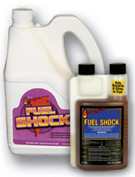 Loading... Please wait...
Loading... Please wait...1-740-568-0432M-F 7:30am - 5:00pm EST
- Home
- Lubrication
- Fuel Additives
- SCHAEFFER'S 285 FUEL SHOCK (1 GAL)
Schaeffer's 285 Fuel Shock (1 Gallon)
Fuel Shock (#285) is a multi-tasking solution to fuel bacteria problems.
One Product - Two Uses:
For Treatment
Fuel Shock can be added to contaminated fuel supplies to kill bacteria present in diesel fuel. This includes vehicle gas tanks as well as fuel supply tanks and storage tanks used to fuel individual vehicles.
- Use if you're unsure of the quality of your fuel from your supplier
- Use in vehicles that have been in storage for extended periods
- Use periodically in storage tanks that may be contaminated
For Maintenance
Vehicles that are stored or that are left exposed at job sites during winter months are at risk of bacteria growth in their fuel tanks. Bacteria will also eventually develop in fuel storage tanks due to moisture accumulation.
- Use to periodically treat fuel in storage tanks
- Use in vehicle gas tanks to prevent bacteria development
- Use prior to storing vehicles for extended periods of time
Battling Bugs in Your Diesel Fuel
Diesel fuels and home heating oils are often stored in conditions that can lead to intimate contact with water. Under these storage conditions the growth of micro-organisms can occur. If left uncontrolled and untreated, such microbial growth can produce dense masses that are capable of clogging filters, pumps and fuel lines. Microbes also release organic acids which can accelerate corrosion of metals that can result in damage to storage tanks and fuel pumping equipment.
A Treatment Solution and Preventive Measure, All in One!
When added to contaminated fuel at the recommended treatment rate, Fuel Shock will kill and control any microbial growth that is present in diesel fuel or home heating oil. Fuel Shock can also be used to shock treat a fuel storage tank that is infested with a large population of micro-organisms. Fuel Shock will kill these micro-organisms so that they can be removed from the system.
After the micro-organisms are killed, the fuel should be pumped out of the storage tanks and filtered to remove the water bottoms and sludge containing the micro-organisms. In extreme cases, where severe microbial growth has occurred and this growth is attached to the walls of the storage tank, the tank should be thoroughly cleaned before the treated fuel is placed back into the tank.




